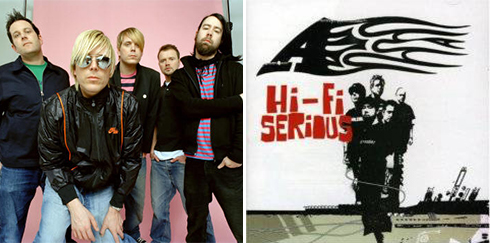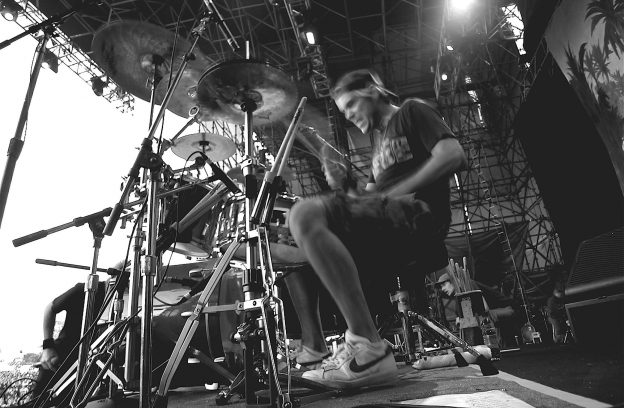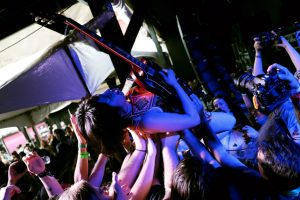Remember that time when we could enjoy concerts, go to festivals and hang backstage to casually talk to band members? Oh, how we miss live music! To ease the pain, we dusted off this in-depth interview with Adam Perry, drummer of Bloodhound Gang and A, which was originally published five years ago. Enjoy!
I kind of miss the onstage vomiting
Becoming a musician is full of highs and lows. There are times when you’re nailing it, and there are other, frustrating times when you feel like giving up altogether. To give you a bit of inspiration, Chordify has gone to the pros for tips on how to persevere, conquer – and rock!
Adam Perry, also known by his stage name The Yin, was born in Leeds, Yorkshire in England in 1969. He’s one of the founding members and drummer of the band A and in 2005, he joined the Bloodhound Gang. Adam is also the CEO of BandApp, which enables musicians to share music, tour dates, and conversations directly to their fans’ smartphones. He sat down with Chordify to talk about his long musical career.
Which song or artist inspired you to pick up an instrument?
I started playing drums when I was 11 years old and Stewart Copeland of The Police was definitely a big influence. My favourite bands when I started out were The Police and The Jam, and I really loved that sort of new wave, post-punk era of music, where bands that started out as underground punk bands suddenly became huge pop bands. Later on I got into heavier music, and that’s when I discovered the band Rush. Once I started to listen to Rush, I was like “Wow, Neil Peart is God!” I tried playing the song ‘Tom Sawyer’ and a couple of other songs and failed miserably of course!
What was the first song that made your fingers ache or bleed?
Definitely ‘Don’t Stand So Close To Me’ by The Police. Copeland just hammers on the bell of the ride. I had this really basic three piece drum kit back then, playing a lot of the new wave era simple kind of stuff you know? This sort of white reggae, and that song really inspired me. The Police were also heavily influenced by reggae and when we got our first record deal with A, the band I was in before Bloodhound Gang, the Police were probably our biggest influence.
What was your biggest obstacle to overcome while learning to play drums?
A genuine lack of talent! (laughs) It was always a big barrier when you hear a song and you think “Oh, I can do this”, but it’s actually quite hard and your lack of talent just gets in the way. Perversely, I never actually wanted to be a drummer. I just wanted to be in a band. But in terms of barriers, musically there wasn’t really one for me, because you can only do what your ability allows you to do, I suppose. I knew what sort of music I was able to play and which styles. But in terms of barriers to being successful, there’s hundreds of them. It takes many years of knocking doors down until you actually get to the holy grail and get a record deal, and then the hard work begins.
We’d been touring for 10 years, with 250 shows a year
Was there a specific moment when you knew you wanted to be a professional musician?
The first concert I ever went to was performed by a band called The Jam, a huge, seminal band. My brother Jason and I washed cars and worked all summer long to buy tickets, and when we were finally able to buy them, the concert was already sold out. Luckily, our parents had already bought the tickets for us as a surprise. They made us work for it and I guess that’s where my entrepreneurial spirit also came from, just doing all sorts of odd jobs around the neighbourhood to buy concert tickets.
When I got to the concert, that was when I realized that this is what I wanted to do. I wanted to be in a band. I wanted to be in a place like this, full of lights and rigs and PA systems and trucks and busses. The whole thing about touring and being in a band was just exciting to me. Not just the playing songs side of it, but the production side of it.
When we moved to London, we used to go out and watch soundchecks. There are just so many venues there, so many concerts and we wanted to see as many of them as we could. It was just cool to watch the bands load in and do soundchecks and see what the daily life of a rock band really was like. That was what really inspired me and I really wanted to be a part of it. Drumming was really a means to get there. I love tapping on stuff and I have a really good sense of rhythm, so I figured drumming was just the best route possible for me to be in a band.
They sent a SWAT team with guns to protect us
What was your first time playing with others like?
My brother Jason and I moved to a sleepy little village in Suffolk, and it was the third day of school, when we jammed together with Mark Chapman. The first time I heard him play guitar at his house, I was just blown away. Here’s this 14 year old, just nailing ‘Hammer To Fall’ by Queen and ‘Eruption’ by Van Halen, and we we’re like, “Fuck! This is amazing!” We genuinely thought he was the best guitar player on earth back then, and he did eventually become one of the best rock guitarists on the planet, on the front cover of Guitarist Magazine and all that stuff.
He’s also an amazing songwriter, coming up with all these great riffs and harmonies and how that could just segue into a great song. The three of us just kept on playing together, and that was basically the foundation of our band A.
Tell us about how your first band A landed you your first record deal
My twin brother Jason and I moved to London at age 19 or 20, and we were on the dole, unemployed for three years. We started our own little studio, called Alien Studios, in Shoreditch, now a really trendy part of London, but at that time it wasn’t at all. We did remixes and commercials for TV ads and stuff like that, until we were in a position to offer the studio for free to major record labels to bring their bands down there. Consequently, we got 30 A&R guys tagging along, sitting in the studio all day and we’d pick their brains out and let them listen to our stuff, getting feedback until they started to take notice.
After struggling for about 5 years, I think it was in ‘95, the band Bush played a gig in London. They played together with a Canadian band called Moist, and they needed a third band for the bill. They chose us, because the poster would say A Moist Bush…we all thought that was incredibly funny!
Bush and Moist were both up and coming, so I guess there were around 30 different record labels there, and, by the end of that night, we had 9 offers! And this was still the heyday of the music industry in Britain, so they gave us pretty much everything we asked for and it became like a 10 year school trip, where we played along with as many bands as we could.
We made bands like Mötley Crüe feel pretty tame
Your third album ‘Hi-Fi Serious’ was a major commercial success and you guys won the Kerrang award for Best British Band in 2002. But you took a long hiatus after the fourth album. Why was that?
We took a long time to write our last album and recorded it in about half a year in a studio in Seattle, along with Limp Bizkit and Soundgarden. This was back in the day when record companies still had endless amounts of money and we spent a fortune on that album. One of the first songs we recorded was ‘Rush Song’, dedicated to Rush. We actually met them in Wembley on our tour and knowing that Rush had heard it was one of the best moments of my life.

‘A’ and the artwork of their success album ‘Hi-Fi Serious’
But other than that moment, commercially our album didn’t do very well. Our previous album did really well and we got a lot of radio play, but we took so long to write the next album that, by the time it came out, the whole world had changed in terms of music. Rock music was not on the radio in England anymore.
But that’s just the way it works. That’s also what’s great about it, I suppose. It’s very cyclic, very fast. It keeps everything very fresh, but it can be negative if you’re on the wrong side of it. I don’t look back with any regret though, we just took far too long making our last album. We were all a bit burnt out because we’d been touring for 10 years, with about 250 shows a year.

Adam Perry in action on stage
How did you get to play drums in the Bloodhound Gang?
We’d all known each other for quite some time before I started playing with them. Their tour manager actually played some songs from our second album for Jimmy Pop, the lead singer, when we were both touring Europe. We got to tour together, initially for just two weeks in Europe, but that became a year and a half and a proper world tour. That just wouldn’t happen these days but our record label was like “OK, fuck it, go do it! Here’s some money, go make it happen.”
The first time we all met each other was in Amsterdam, at the Melkweg and we just instantly became best friends. When ‘The Bad Touch’ suddenly became a huge hit, the concert venues just kept getting bigger and bigger and suddenly we were playing stadiums in the US together, and we just became this big traveling family. We kept in touch, went to each other’s weddings and when their drummer quit just after we decided to take a hiatus with A, they called me up and asked me if I could fill in for three weeks. So I got the tour dates, and it was all arenas in Europe, which was just amazing. I was busy setting up my business, but I thought it was great just to get the drums out again and play for three weeks. That turned into a six year tour…
Up until the incident in Russia probably? Where Jared the bass player pulled a Russian flag through his pants?
Yeah… we got deported. It was pretty frightening at the time. It was just absolutely insane, being locked in an airport for 9 hours. They locked down the airport and a bunch of Cossacks beat us up. We got the embassies involved and they sent a SWAT team with guns to protect us. We were all over the news and there was a crowd outside burning American flags. It was just insane. When we were finally able to fly to Moscow, we immediately got arrested and we got deported after a couple of days. We were banned from entering, including our families, for five years.
What still matters is just writing great songs
What are you guys up to now?
We’re actually still feeling the ramifications of what happened in Russia. We’re still not able to perform in several countries, which is a terrible shame really. So we released a new album in January this year, but we don’t have any shows planned. I might do a few reunion shows with A though, we did one last year. But we’ll see how it goes.
I would love to play a few Bloodhound Gang shows again though. They’re just an amazing and actually very intelligent bunch of people, despite all the pranks (laughs). I was the boring guy, going to bed around 1 a.m., but I’ve seen so many crazy and hilarious things with those guys. We made bands like Mötley Crüe feel pretty tame! I kind of miss the onstage vomiting, feeding people packs of butter and letting fans drink 27 cans of Red Bull on a dare!
You’re also the CEO of BandApp, an app that enables musicians to share music, tour dates, and conversations directly to their fans’ smartphones. How’s that going?
It’s been a rough couple of years, because the digital music industry is a really difficult industry to be in and raise investments. But people still use our app a lot and it never ceases to amaze me how many people build BandApps every day. We’re about to go for a major pivot, however, which I can’t talk too much about, but it’s going to be incredible and it can really scale into a global thing. We’ve been working on something for the last year in the live space, so arena based live shows, which we’re going to become part of and it’s really exciting. So it’s not going to be so much music focused anymore but more based on entertainment.
Any advice for kids just starting out in the industry?
The days of 9 figure record deals and gold plated tour busses are probably gone for most people, I think. Especially in rock music. I guess when that’s your idea of success, it’s about managing those expectations. If you can make a living playing music, if you make a living touring with friends, well, that’s being successful already. You can do a lot yourself nowadays, in terms of promotion and putting your songs online, connecting with fans. Things like BandCamp, iTunes and BandApp and loads of other platforms and apps will let you do that.
I think it’s still fairly easy to get to a level where you play venues of 500 to 2000 people, but there’s a glass ceiling above that, and not many bands are able to break through that ceiling and become hugely successful. What still matters is just writing great songs. Just look at Adele. Love her or hate her, she writes amazing pop songs. Not a single one of her songs isn’t great. Once you write a great song and put it online, it’s just there and it will remain there. If you’re lucky and if it’s the right time, fans and record companies will find you.


